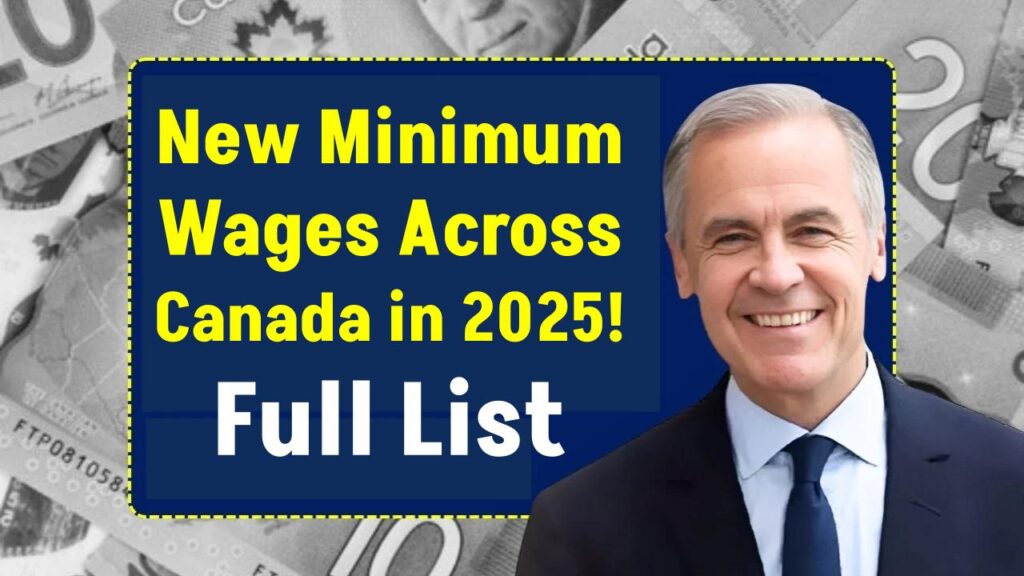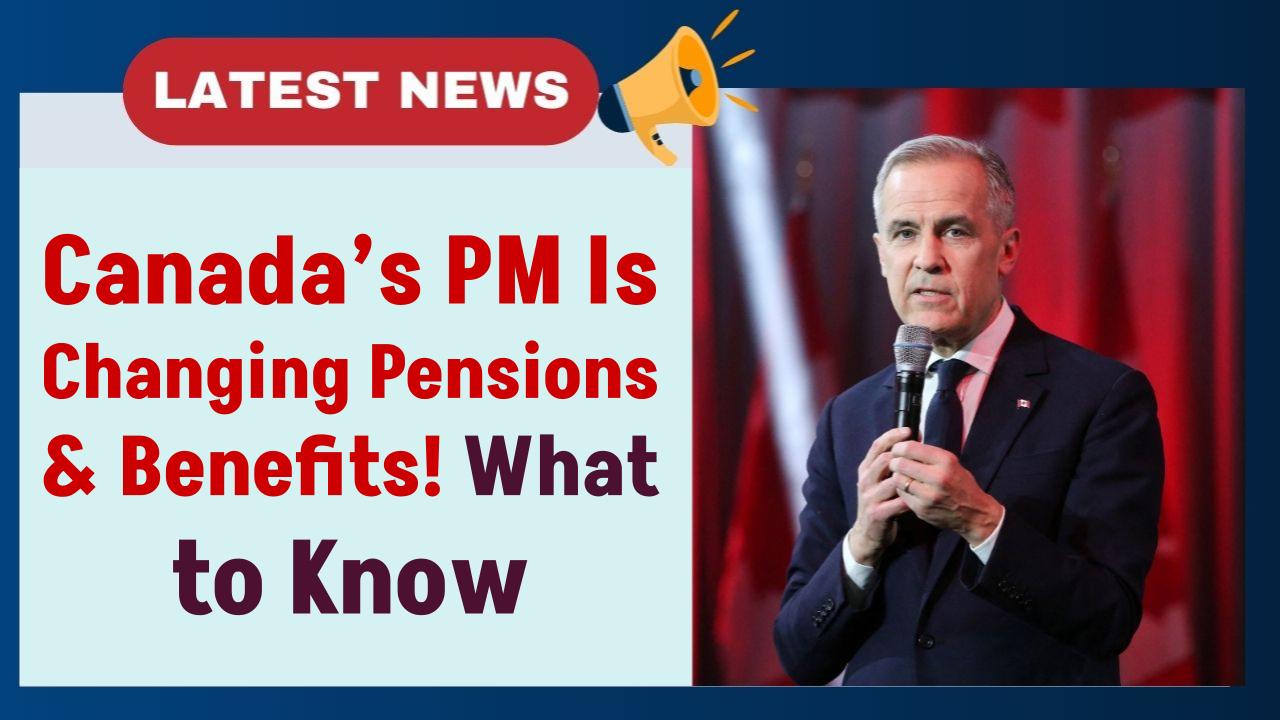Which Provinces Are Raising Wages in 2025? Canada’s Minimum Pay Update Is Here
Which Provinces Are Raising Wages in 2025: As of April 2025, multiple Canadian provinces and territories have either increased their minimum wages or have announced future raises to support workers coping with inflation and rising living costs. These changes aim to ensure fairer pay structures, especially for low-income and hourly workers in Canada’s diverse labor market.
Whether you’re a student with a part-time job, a full-time worker, or an employer trying to stay compliant, understanding the latest minimum wage updates is crucial. In this article, we break down the exact minimum wage increases in 2025 across Canada, what they mean for you, and how to stay informed going forward.

Which Provinces Are Raising Wages in 2025
| Province/Territory | Minimum Wage (April 2025) | Upcoming Increase | Effective Date | Official Link |
|---|---|---|---|---|
| Federal (Canada-wide) | $17.75 | — | April 1, 2025 | canada.ca |
| British Columbia | $17.40 | $17.85 | June 1, 2025 | retailcouncil.org |
| Alberta | $15.00 | No change | — | retailcouncil.org |
| Saskatchewan | $15.00 | Expected | October 1, 2025 | — |
| Manitoba | $15.80 | $16.00 | October 1, 2025 | — |
| Ontario | $17.20 | $17.60 | October 1, 2025 | — |
| Quebec | $15.75 | $16.10 | May 1, 2025 | — |
| Nova Scotia | $15.70 | $16.50 | October 1, 2025 | — |
| New Brunswick | $15.65 | — | April 1, 2025 | — |
| Newfoundland & Labrador | $16.00 | — | April 1, 2025 | — |
| Prince Edward Island | $16.00 | — | October 1, 2024 | — |
| Yukon | $17.94 | — | April 1, 2025 | — |
| Northwest Territories | $16.70 | — | September 1, 2024 | — |
| Nunavut | $19.00 | — | January 1, 2024 | — |
Canada’s 2025 minimum wage increases reflect a continued effort to provide fair, livable wages to workers amidst economic pressure. While some provinces are moving faster than others, most Canadians can expect better pay in the months ahead. Whether you’re a business or a worker, staying informed is key to making the most of these changes.
Why Are Provinces Raising Minimum Wages in 2025?
The main drivers behind these increases are:
- Inflation: As the cost of groceries, fuel, and housing climbs, provinces are adjusting minimum wages to match the cost of living.
- Worker retention and productivity: Higher wages contribute to better job satisfaction and reduce turnover, especially in retail, hospitality, and services.
- Public pressure: Labor advocates have been pushing governments to ensure livable wages, not just minimum ones.
These changes are part of a broader national trend toward more equitable pay structures in Canada.
Detailed Breakdown by Region
1. Federal Minimum Wage (Canada-Wide)
The federal minimum wage rose to $17.75/hour as of April 1, 2025. This applies to federally regulated industries like banking, interprovincial transportation, and telecom. If you’re in a province where the wage is higher, the higher wage applies.
Example: If you work in a federally regulated job in British Columbia, your minimum wage will be $17.85/hour from June.
2. Western Canada
- British Columbia: Wage rises from $17.40 to $17.85/hour on June 1, 2025. BC continues to lead the West in wage fairness.
- Alberta: Still at $15.00/hour with no planned increases since 2018, despite inflation.
- Saskatchewan: Currently $15.00/hour, with expected updates by October 2025.
- Manitoba: Raised to $15.80, and will rise again to $16.00/hour on October 1, 2025.
3. Central Canada
- Ontario: Increased to $17.20/hour and will climb to $17.60 on October 1, 2025. Ontario’s wage structure is closely tied to annual inflation indexing.
- Quebec: Set to $16.10/hour on May 1, 2025, up from $15.75.
4. Atlantic Canada
- Nova Scotia: Wage is now $15.70/hour, and will rise to $16.50/hour in October.
- New Brunswick: Slight bump to $15.65/hour from April 1.
- Newfoundland & Labrador: Now at $16.00/hour as of April.
- Prince Edward Island: Reached $16.00/hour last October — one of the first to cross this milestone in the Atlantic region.
5. Northern Territories
- Yukon: Leading with $17.94/hour, effective April 1.
- Northwest Territories: Set at $16.70/hour from September 2024.
- Nunavut: Canada’s highest minimum wage — $19.00/hour since January 2024 — reflects the territory’s exceptionally high living costs.
Which Provinces Are Raising Wages in 2025: How Will This Impact Workers and Employers?
For Workers:
- Increased take-home pay means improved financial stability.
- Easier budgeting for essentials like rent, food, and transport.
- May reduce dependence on government income support programs.
For Employers:
- Higher costs for labor may impact small business margins.
- Employers should adjust budgets and payroll systems accordingly.
- But better pay often leads to better employee retention, which reduces hiring costs.
Tips for Employers and Employees
For Employers:
- Review payroll systems regularly to ensure compliance.
- Communicate changes to employees in advance.
- Use official sources to stay updated (like Retail Council of Canada).
For Employees:
- Make sure your employer is following the law.
- Use this wage bump to create a monthly budget or start saving.
- Check if you’re in a federally regulated sector — this might mean higher pay applies.
FAQs on Which Provinces Are Raising Wages in 2025
Q1. What is the highest minimum wage in Canada in 2025?
Nunavut leads with $19.00/hour, effective since January 2024.
Q2. Which provinces are increasing wages in 2025?
Provinces like British Columbia, Quebec, Ontario, Nova Scotia, and Manitoba have confirmed increases scheduled during the year.
Q3. Will Alberta raise its minimum wage in 2025?
No new increases have been announced for Alberta as of now.
Q4. Does federal minimum wage override provincial wage?
Only in federally regulated industries — otherwise, workers receive the higher of the two.
Q5. Where can I check the official rates for my province?
Visit the Retail Council of Canada or your provincial labor ministry’s website.








